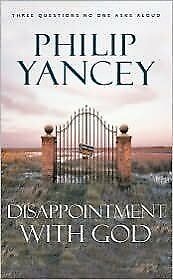Yancy reviews Old Testament history where God showed himself in plagues and in the pillar of cloud by day and fire by night. As we were studying the book of Exodus, one of my 6th-grade Sunday school students wanted to know, “Why doesn’t God do stuff today like he did in the Bible?” Having spent much of my adult life as a missionary in the developing world, I am aware that God intervenes supernaturally much more in contexts where he is just beginning to be known than he does in places like North America. But why? Yancy points out that in the Old Testament God’s presence was undeniable, yet his people still rebelled instead of believing. God gave Solomon everything he could have wanted, yet Solomon squandered those gifts and wandered spiritually later in life. It struck me as kind of like in a gym. If every time you go to lift the weights your trainer reaches over to do the heavy lifting, your faith muscles won’t get any stronger. Yancy takes comfort in looking back. “We may see the ‘disadvantages’ to God’s closeup interventions: his Presence, too bright for us, leaves scorch marks; it creates distance; and worse, it doesn’t even seem to foster faith”(p. 100).
Yancy paints a God whose desire is love not domination. He doesn’t want us to grudgingly admit he is all-powerful; he wants us to embrace him. Hence the incarnation. “What could not be won through power, he would win through suffering” (p. 100). We say God is silent, hidden, unfair, but Jesus says, “Follow me,” he shows us the father and he participates in our suffering because his kingdom is not of this world. The Temptation shows Jesus refusing to take shortcuts, perhaps because he knows such obvious miracles short-circuit faith and don’t allow it to grow. “Miracles attracted crowds, yes, but rarely encouraged long-term faithfulness” (p. 116). Yancy sees Jesus’ miracles as “signs of his mission, previews of what God would someday do for all creation” (p.118). In Gethsemane and on the cross Jesus experienced the ultimate disappointment with God. "My God, my God, Why have you forsaken me?" God subjects himself to the same suffering and darkness we suffer. He never forces anyone to believe. He makes possible an intimacy with God that powerful proof never could. When Jesus returned to heaven, he delegated the kingdom of God to his disciples and gave us the Holy Spirit. According to Yancy, someone looking for God should be able to look at us and see him. So maybe the disappointment many experience with God is really disappointment with the church—with me. The book of Job is the classic biblical study of suffering. There Yancy sees that lots more is going on behind the scene than we can possibly know from our human perspective. Life is unfair, but God does not equal life. “We need more than a miracle. We need a new heaven and a new earth, and until we have those, unfairness will not disappear” (p. 186). Yancy begins the book with a friend who abandons his faith because of his disappointment with God. He comes back to that friend’s struggle many times, even discussing the ideas of the book with him. Yancy has no simple answers—his friend is not convinced—but he takes seriously our doubts and disappointments and comes down on the side of faith. In my fiction I want to do the same. I once made a list of things I was mad at God about. It was not a short list. At the top was my brother's sudden death at the age of 45 at the peak of ministry in a large church with his own kids just coming into adulthood when they needed him so much. The list included things like why God would allow Robert Mugabe to run Zimbabwe into the ground well into his 90s. How easy would it have been for God to give Mugabe a blood clot in the brain instead of my brother? Re-reading Yancy didn't just help me to create a believable story arc for my characters. It helped me to rethink why a sovereign God sometimes allows such things in my life and the loves of those I love and go on worshipping even when I don't understand.
0 Comments
Leave a Reply. |
AuthorLeAnne Hardy has lived in six countries on four continents. Her books come out of her cross-cultural experiences and her passion to use story to convey spiritual truths in a form that will permeate lives. Add http://www.leannehardy.net/1/feed to your RSS feed.
To receive an e-mail when I post a new blog, please subscribe.
Categories
All
Archives
November 2022
|

 RSS Feed
RSS Feed